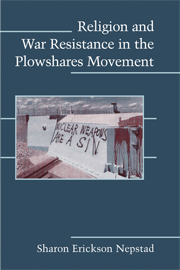Book contents
- Frontmatter
- Contents
- List of Tables and Figures
- Preface
- Acknowledgments
- Religion and War Resistance in the Plowshares Movement
- INTRODUCTION: MOVEMENT CHALLENGES AND TRAJECTORIES
- Part I The U.S. Plowshares Movement
- Part II The International Plowshares Movements
- 5 INTERMITTENT RESISTANCE: THE GERMAN, DUTCH, AND AUSTRALIAN PLOWSHARES MOVEMENTS
- 6 INTERNAL TENSIONS AND IMPLOSION: THE SWEDISH PLOWSHARES MOVEMENT
- 7 WITNESSING OR WINNING? THE BRITISH PLOWSHARES MOVEMENT
- 8 CONCLUSION: FROM FAILED ATTEMPTS TO PERSISTENT RESISTANCE – UNDERSTANDING DIVERGENT MOVEMENT TRAJECTORIES
- Appendix A Survey Questionnaire
- Appendix B List of Interviews by Author
- Appendix C Chronological List of Plowshares Actions by Region
- Bibliography
- Index
7 - WITNESSING OR WINNING? THE BRITISH PLOWSHARES MOVEMENT
Published online by Cambridge University Press: 05 September 2012
- Frontmatter
- Contents
- List of Tables and Figures
- Preface
- Acknowledgments
- Religion and War Resistance in the Plowshares Movement
- INTRODUCTION: MOVEMENT CHALLENGES AND TRAJECTORIES
- Part I The U.S. Plowshares Movement
- Part II The International Plowshares Movements
- 5 INTERMITTENT RESISTANCE: THE GERMAN, DUTCH, AND AUSTRALIAN PLOWSHARES MOVEMENTS
- 6 INTERNAL TENSIONS AND IMPLOSION: THE SWEDISH PLOWSHARES MOVEMENT
- 7 WITNESSING OR WINNING? THE BRITISH PLOWSHARES MOVEMENT
- 8 CONCLUSION: FROM FAILED ATTEMPTS TO PERSISTENT RESISTANCE – UNDERSTANDING DIVERGENT MOVEMENT TRAJECTORIES
- Appendix A Survey Questionnaire
- Appendix B List of Interviews by Author
- Appendix C Chronological List of Plowshares Actions by Region
- Bibliography
- Index
Summary
To strengthen cross-continental movement ties, European activists sponsored the first global Plowshares gathering in Kiel, Germany, in May 1996. The theme of the retreat was “Evaluating the Plowshares Movement: Building the Movement Worldwide.” Twenty-seven people attended – four from Great Britain, three from the U.S., twelve from Sweden, six from Germany, one from the Netherlands, and one from Australia. During this gathering, it became quickly apparent that regional distinctions and cultural variations had evolved as the movement spread internationally. Stephen Hancock, an English Plowshares activist, described some of the differences that were evident at this trans-Atlantic gathering.
Perhaps the greatest tension within the gathering was between the U.S. and Swedish Plowshares traditions.… The mainstays of the movement [in the U.S.] have been the east coast Atlantic Life Community, Baltimore's Jonah House,… and the more radical houses of the Catholic Worker movement. They exercise a radical Christian faith based on Bible study, political reflection, community living and worship, often hospitality work and regular acts of nonviolent resistance.… The actions are seen as a witness to God's intended order of comprehensive justice and peace, acts of solidarity with the poor, and calls to others to join resistance. Practically all the actions have leaned towards symbolic levels of military property damage, the symbolic communicating that three or four people cannot achieve disarmament – the hands of God and others are needed. Largely ignored by the media, the [U.S.] activists talk of an essential value to the actions that does not depend on results.…
The [Swedish] Plowshares movement describes and views itself in very strategic political terms, almost devoid of the religious language and images prevalent in the U.S. movement.[…]
- Type
- Chapter
- Information
- Religion and War Resistance in the Plowshares Movement , pp. 181 - 202Publisher: Cambridge University PressPrint publication year: 2008



